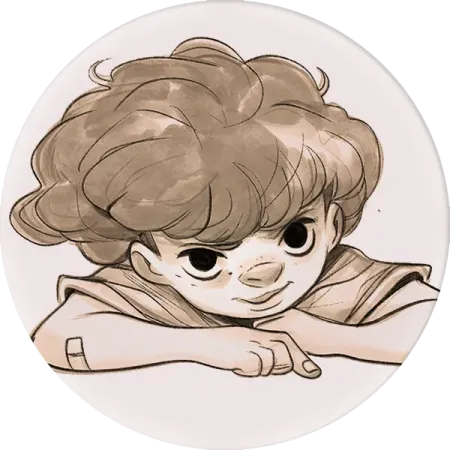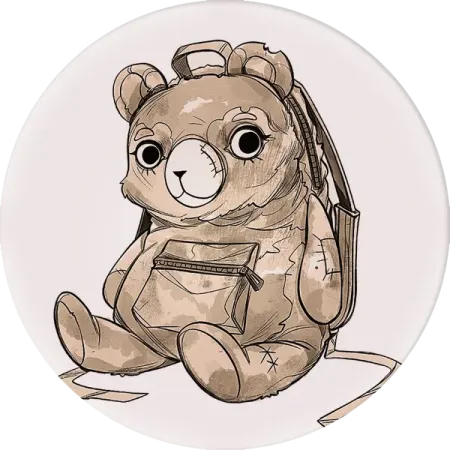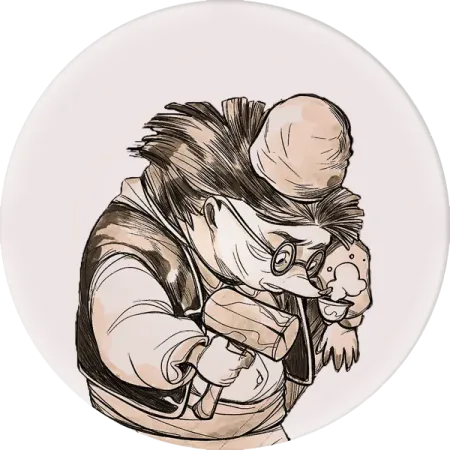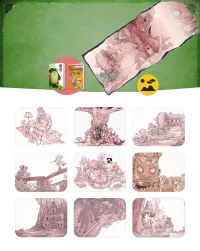Grandpa Hedgehog’s Watermill
Anne wants to help, but finds herself caught
in a clash between different worlds.
Where she comes from, “hotline”
means care — but here, it sounds like an insult.
Indeed, the path soon led them to a small open spot by the riverside, where — nestled among a few shady trees — stood the little white watermill.
And the watermill truly was beautiful. Its base was made of stone, about as tall as a grown person. The carefully whitewashed walls, dotted with dainty little windows, looked almost edible — Anne couldn’t help but think of Hansel and Gretel. A short wooden staircase led up to a veranda with a railing, which connected to a door adorned with a large horseshoe — partly for luck, partly as a charm. The roof was made of gray-green mossy stones, and on top of it perched a crooked little chimney puffing smoke even now, in the middle of summer.
The mill wheel, nearly as tall as the building itself, stood just to the left. A complex network of wooden channels began at the wheel and branched outward to cover the entire garden in front of the mill. But right now, everything was dry. The wheel wasn’t turning.
In front of the mill stood a small hedgehog, leaning on a gnarled walking stick, tapping here and there on various mechanisms and shaking his head in dismay. Grandpa Hedgehog, like the mill itself, looked as if he had stepped straight out of a Bulgarian folktale. He wore a white linen shirt, an embroidered vest, and thick wool trousers cinched with a red sash. On his head sat a fuzzy cap. A clay pipe rested in his mouth, and his small clever eyes peered through thick, round tin-rimmed glasses.
“Oh dear, oh dear, oh dear! What a mess!” the old hedgehog grumbled. “All my work, wasted! The darn thing just won’t spin!”
“Good afternoon,” Anne said cautiously. “Are you Grandpa Hedgehog?”
“Ah, yes, good afternoon to you too, young lady,” the old man said, startled — he hadn’t noticed her before. “Though it may not be a good one, from the looks of things.”
“Why? What happened?”
“I’ve got trouble, big trouble! See that wheel over there? When it turns, it draws water from the river and waters my garden. I don’t know if it slipped or got stuck, but it just won’t turn anymore — all day long! My little plants aren’t used to dryness… poor things.”
Reflections on the scene
⸻ ❦ ⸻
– ❦ –
At first glance, this scene feels like a gentle detour—a cozy old mill, a hedgehog in folk costume, a hiccup in a water system. But under the mossy roof and quaint chatter lies a moment of quiet dissonance.
Grandpa Hedgehog belongs to another world—a world of stories told slowly, problems solved by hand, and traditions passed on without manuals. His mill has stopped, and like any old villager, he blames fate, not engineering. But then Anne shows up—modern, curious, full of suggestions. “Why not call the hotline?” she asks.
And suddenly, the story trips.
He hears only the end of her word, and takes deep offense. In his ears, it’s not “help” she offers—it’s a kind of insult. Language, once a bridge, becomes a wall. She speaks from a world of customer service and tech solutions. He listens from a world where people fix things or quietly suffer.
It’s a small misunderstanding—but it opens something deeper. We’re reminded that words don’t just carry meaning. They carry history, tone, culture. One person’s solution is another’s absurdity.
And yet, the scene doesn’t mock either of them. Anne isn’t wrong to suggest help. Grandpa Hedgehog isn’t wrong to bristle at a word that doesn’t belong. They come from different systems, and the misunderstanding is part of the charm.
More importantly, Anne doesn’t argue. She listens. She doesn’t fully understand—but she respects the distance. It’s one of the first times we see her slow down and reflect.
Not every problem in this world will be solved by a button or a clever fix. Some will require patience. Or silence. Or simply… not saying “hotline.”






